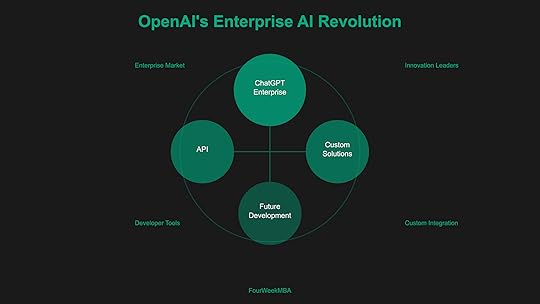OpenAI’s Enterprise AI Revolution

OpenAI’s Enterprise AI Revolution: Transforming Industries Through Advanced Intelligence
The rapid evolution of artificial intelligence is reshaping enterprise operations across multiple sectors, with OpenAI emerging as a pivotal force in this transformation. Recent developments showcase how AI integration is no longer optional but essential for business survival and growth, with major corporations implementing sophisticated AI solutions to maintain competitive advantages and drive innovation.
Strategic ContextOpenAI’s enterprise solutions are catalyzing a fundamental shift in how businesses approach artificial intelligence. The company’s strategic positioning focuses on democratizing advanced AI capabilities while maintaining robust safety measures and ethical considerations. This approach has resonated strongly with enterprise clients seeking to leverage AI without compromising security or reliability.
The recent showcase at the Shanghai World AI Conference demonstrates the accelerating pace of AI innovation, particularly in robotics and autonomous systems. This advancement parallels OpenAI’s commitment to developing practical, scalable solutions for enterprise applications. The conference highlighted how AI integration is becoming increasingly sophisticated, with applications extending beyond traditional computational tasks to physical world interactions.
Business ImpactThe impact of OpenAI’s enterprise solutions is particularly evident in several key sectors:
In the utilities sector, Duke Energy’s strategic AI implementation exemplifies how energy companies can leverage advanced intelligence for grid management and operational efficiency. Their approach includes predictive maintenance, demand forecasting, and automated grid optimization, setting new standards for the industry.
Mining giant Rio Tinto’s adoption of AI-driven automation showcases the potential for industrial-scale applications. Their implementation focuses on safety improvements, operational efficiency, and resource optimization, demonstrating how AI can transform traditional heavy industries.
The travel industry’s rapid AI adoption indicates a broader trend toward personalized service delivery and operational streamlining. Companies are implementing AI-powered booking systems, predictive analytics for demand management, and automated customer service solutions.
Key InsightsSeveral critical insights emerge from analyzing OpenAI’s enterprise revolution:
1. Integration Velocity: The speed at which companies are adopting AI solutions has accelerated dramatically, with implementation timelines shrinking from years to months.
2. Cross-Industry Application: AI solutions are proving adaptable across diverse sectors, from heavy industry to consumer services, indicating the technology’s versatility.
3. ROI Acceleration: Companies implementing AI solutions are reporting faster returns on investment, particularly in operational efficiency and cost reduction.
4. Competitive Necessity: AI adoption is increasingly viewed as essential for maintaining market position rather than as an optional enhancement.
Looking AheadThe future trajectory of enterprise AI suggests several key developments:
1. Enhanced Integration: Future AI solutions will likely feature deeper integration with existing enterprise systems, creating more seamless operational environments.
2. Autonomous Decision-Making: AI systems will increasingly handle complex decision-making processes, particularly in areas requiring rapid response to changing conditions.
3. Customization at Scale: Enterprise AI solutions will offer greater customization capabilities while maintaining scalability across large operations.
4. Collaborative Innovation: Partnerships between AI providers and enterprise clients will drive innovation in specific industry applications.
The evolution of enterprise AI capabilities will likely accelerate as more companies recognize the competitive advantages of early adoption. This trend suggests a future where AI becomes increasingly central to business operations across all sectors.
The enterprise AI revolution led by OpenAI represents a fundamental shift in how businesses operate and compete. As companies across various sectors demonstrate successful AI integration, the technology’s role in enterprise operations will only grow more significant. The key to success lies in strategic implementation, careful consideration of industry-specific needs, and a commitment to continuous innovation. Organizations that embrace this transformation while maintaining focus on practical applications and measurable outcomes will be best positioned to thrive in the AI-driven future of business.
The post OpenAI’s Enterprise AI Revolution appeared first on FourWeekMBA.



